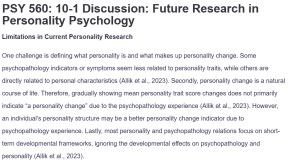PSY 560: 10-1 Discussion: Future Research in Personality Psychology
Limitations in Current Personality Research
One challenge is defining what personality is and what makes up personality change. Some psychopathology indicators or symptoms seem less related to personality traits, while others are directly related to personal characteristics (Allik et al., 2023). Secondly, personality change is a natural course of life. Therefore, gradually showing mean personality trait score changes does not primarily indicate “a personality change” due to the psychopathology experience (Allik et al., 2023). However, an individual’s personality structure may be a better personality change indicator due to psychopathology experience. Lastly, most personality and psychopathology relations focus on short-term developmental frameworks, ignoring the developmental effects on psychopathology and personality (Allik et al., 2023).
Types of Research that Would Address these Limitations
The most compelling studies to address the challenges are longitudinal studies. Cross-sectional studies cannot fully explain the relationship between personality psychopathology and long-term developmental framework (Allik et al., 2023). Furthermore, studies beginning with birth cohorts and extending into old age are significant in addressing the limitations. Taking into consideration the psychopathology form- including the periods of risk and age-related manifestations of the disorder- and the personality traits being investigated, longitudinal studies that are “shorter” can be informative (Allik et al., 2023).
Key Areas of Future Research in Personality Psychology
A key area that future research should focus on is personality change, its effect on health among persons at various life stages, and its effect on the proximal and distal outcomes (Luo et al., 2022). The interest in personality and its association with health outcomes has prompted questions on whether a change in personality can be a predictor of mental and physical health. According to research, personality usually changes across the lifespan, and that change may have a substantial effect on health outcomes (Luo et al., 2022). Notably, personality change is a key issue that should be investigated in future studies.
References
Allik, J., Realo, A., & McCrae, R. R. (2023). Conceptual and methodological issues in the study of the personality-and-culture relationship. Frontiers in Psychology, 14. https://doi.org/10.3389/fpsyg.2023.1077851
Luo, J., Zhang, B., Estabrook, R., Graham, E. K., Driver, C. C., Schalet, B. D., Turiano, N. A., Spiro, A., & Mroczek, D. K. (2022). Personality and health: Disentangling their between-person and within-person relationship in three longitudinal studies. Journal of Personality and Social Psychology, 122(3), 493–522. https://doi.org/10.1037/pspp0000399
ORDER A PLAGIARISM-FREE PAPER HERE
We’ll write everything from scratch
Question
Prompt: Discuss where you think personality psychology research is headed. In your initial post, consider the following questions:
- * Do you see limitations in current personality research?
- * What types of research would address these limitations?
- * What are the key areas of future research in personality psychology?
PSY 560: 10-1 Discussion: Future Research in Personality Psychology
Readings:
- Textbook: The Personality Puzzle,
- Towards an Explanatory Personality Psychology: Integrating Personality Structure, Personality Process, and Personality Development
- This article considers one way that personality psychology might become universal and how that might be reflected in future research.


